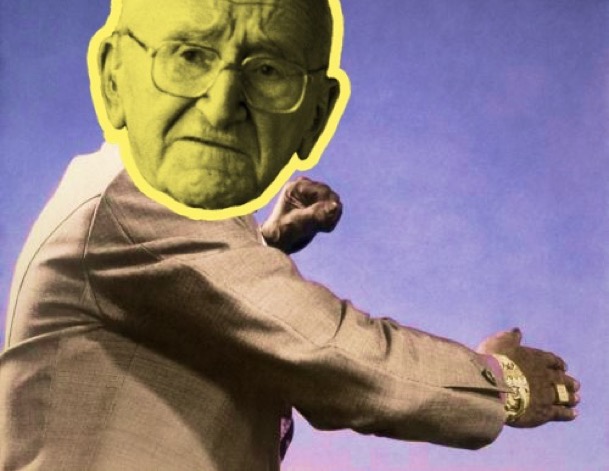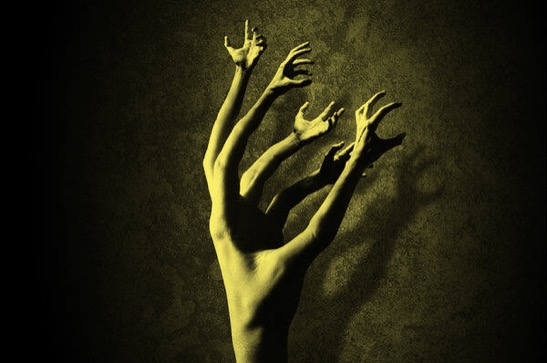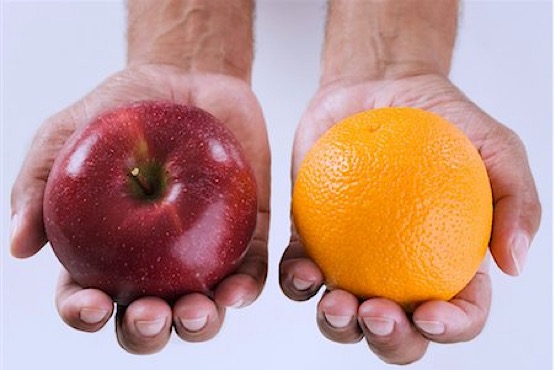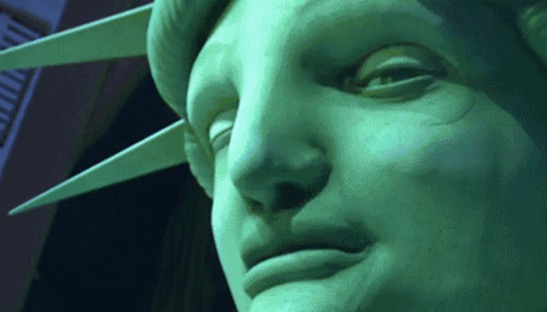No invisible hand guides the hearts of the people.
The Invisible Backhand

Life under liberalism is servile, though there is no slavery.
Friedrich Hayek runs into a problem early on in The Constitution of Liberty. His arguments for liberty are predicated on ignorance—“all institutions of freedom are adaptations to this fundamental fact of ignorance,” he writes—yet he wants to say with certainty that liberty itself is valuable. Hayek needs to make a system-level claim with great confidence, even though the system is built on the impossibility of knowing the good beyond the individual level.
He retreats from philosophy to faith and social convention to square this circle. “Our faith in freedom does not rest on the foreseeable results in particular circumstances,” he writes, “but on the belief that it will, on balance, release more forces for the good than for the bad.” And how do we know what’s good or bad? “We must recognize,” he continues,
that even what we regard as good or beautiful is changeable…we do not know what will appear as good or beautiful in another generation. Nor do we know why we regard this or that as good or who is right when people differ as to whether something is good or not. It is not only in his knowledge, but also in his aims and values, that man is the creature of civilization; in the last resort, it is the relevance of these individual wishes to the perpetuation of the group or the species that will determine whether they will persist or change.
Our tastes and preferences—all the way up to our idea of the good—are socially conditioned, with survival “of the group or the species” (a curious fork in the road there) as the ultimate justification. The good and the beautiful, the bad and the base, are fluid: they are social constructs, and perhaps even consciously constructed—though Hayek keeps the attribution of agency as vague and impersonal as possible. The invisible hand not only guides us to benefit our fellow man through our immediately selfish actions, it teaches us what benefit means.
We can’t evaluate its actions independently, from the outside, for our standards of evaluation are themselves the product of this invisible hand. We know the Bible is the word of God because the Bible tells us it is the word of God. We know the invisible hand is benevolent because benevolence, like all things, is socially defined, and society is the creation of the invisible hand. If life is good, then creation is benevolent, and so is the creator.
A Not So Helping Hand
Yet there remain doubters and unbelievers. One can grant that free exchange takes place when both parties (in the simplest case) expect to gain from the transaction. One can grant the next few steps as well: satisfactory transactions and the promise of more to come provide incentives for more work—in order to engage in more exchange—and more work produces things that people want in greater quantities; the increase in output and the proliferating variety of transactions can produce widespread prosperity and gratification of consumer preferences. What can’t be calculated, however, is the systemic opportunity cost: that is, not the aggregate of opportunity costs within the system, but the cost of the system itself.
What if the invisible hand is actually an invisible backhand, as individually merited transactions (according to the participants themselves) give rise to a social, psychological, or spiritual order that these same people would not have chosen had they been able to choose at a level beyond individual action? The adulterer wants to cheat and still have his marriage, and perhaps the benefits of marriage as a general social ideal, too. But if everyone goes for what’s immediately and individually gratifying, the system-level goods that arise from denial cannot be obtained. Liberals who invoke the magic of the invisible hand have to insist that these precluded system-level goods are irrelevant, no matter how much your heart may tell you otherwise.
The difference between an invisible hand and an invisible backhand is in part a matter of perspective—personal as well as social. This is one of the problems that liberals face today: if people feel discontented with the lives that globalism has produced, what good is it to point to poverty statistics or the cheap price of flat-screen televisions? The question isn’t whether those things are worth something; it’s whether there can’t be something else that is worth still more.
This question is separate from specific questions about what evolutionary and other benign adversarial systems can achieve in various contexts. Such systems are not intrinsically liberal, unless Aristotle was a liberal two thousand years early when he addressed such topics as mixed constitutions and occasions when diverse viewpoints do indeed generate good judgment. Philosophy for Saint Thomas no less than for Plato requires weighing opposing contentions. And in politics there are more modest yet stronger claims to be made for free speech and checks and balances than the hope that the first produces truth and the second makes government positively great. The negative arguments—that free speech prevents a uniformity of error and balanced government plausibly impedes despotism—do not depend on the invisible hand; on the contrary, they depend on staying the most visible and grasping of hands of all.
Put Not Your Faith in Systems
Human life is complex, and liberalism is an inadequate response to that complexity: in this, it is like every other ideology. It has become a cause of much folly, but it is in its origins an effect of a deeper tendency: the disintegration of hierarchy and the rise of equality that began, as Tocqueville suggests, in the Middle Ages. A world in which authority was as fragmented as it was at the height of Christendom—when pope and emperor, emperor and cities, kings and nobility, nobility and Church, and the various power centers within the Church were all in competition—was a matrix in which commerce could thrive and loyalties were distributed in such a way as to leave no singular source of allegiance.
Out of this interplay of powers arose rapacious political and commercial interests in the early modern era: absolutism on the one hand, violent monopolization of markets and resources on the other. Before the appearance of liberalism under its own name, the moral philosophers of the 18th century sought formulas to tame and humanize the destructive powers of the two centuries before them—to describe principles of commerce that did not require the methods of, say, the East India Company, or principles of politics that would provide security without despotism. Adam Smith’s notion of the invisible hand was part of this effort, as was the constitutional thought of America’s Founding Fathers. These men largely succeeded within their own domains, and for a long time. But the forces of corruption cannot be routed forever in this world, and those forces can co-opt even the most humane of ideas.
The invisible hand was gentler than the hand that held the whip, but it was never a good basis for a faith. Of late, this idea of the invisible hand has come to look more like a velvet glove for ideology’s iron fist. Prosperity legitimizes power, and power commodifies human existence. Life under liberalism is servile, though there is no slavery. Endless wars are fought to spread the liberal faith to heathen lands and draw them into the liberal world political and economic order, though we don’t call this colonialism. Something new is now needed to tame liberalism the way the invisible hand was once used to tame mercantilism and the early modern state.
The American Mind presents a range of perspectives. Views are writers’ own and do not necessarily represent those of The Claremont Institute.
The American Mind is a publication of the Claremont Institute, a non-profit 501(c)(3) organization, dedicated to restoring the principles of the American Founding to their rightful, preeminent authority in our national life. Interested in supporting our work? Gifts to the Claremont Institute are tax-deductible.
Disillusioned liberalism can pull us from the hellbroth of clashing absolutists.
Vermeule's Adam Smith is a straw man.
A different leap of faith could be far more dangerous.
Is liberalism still entitled to give itself a hand?





